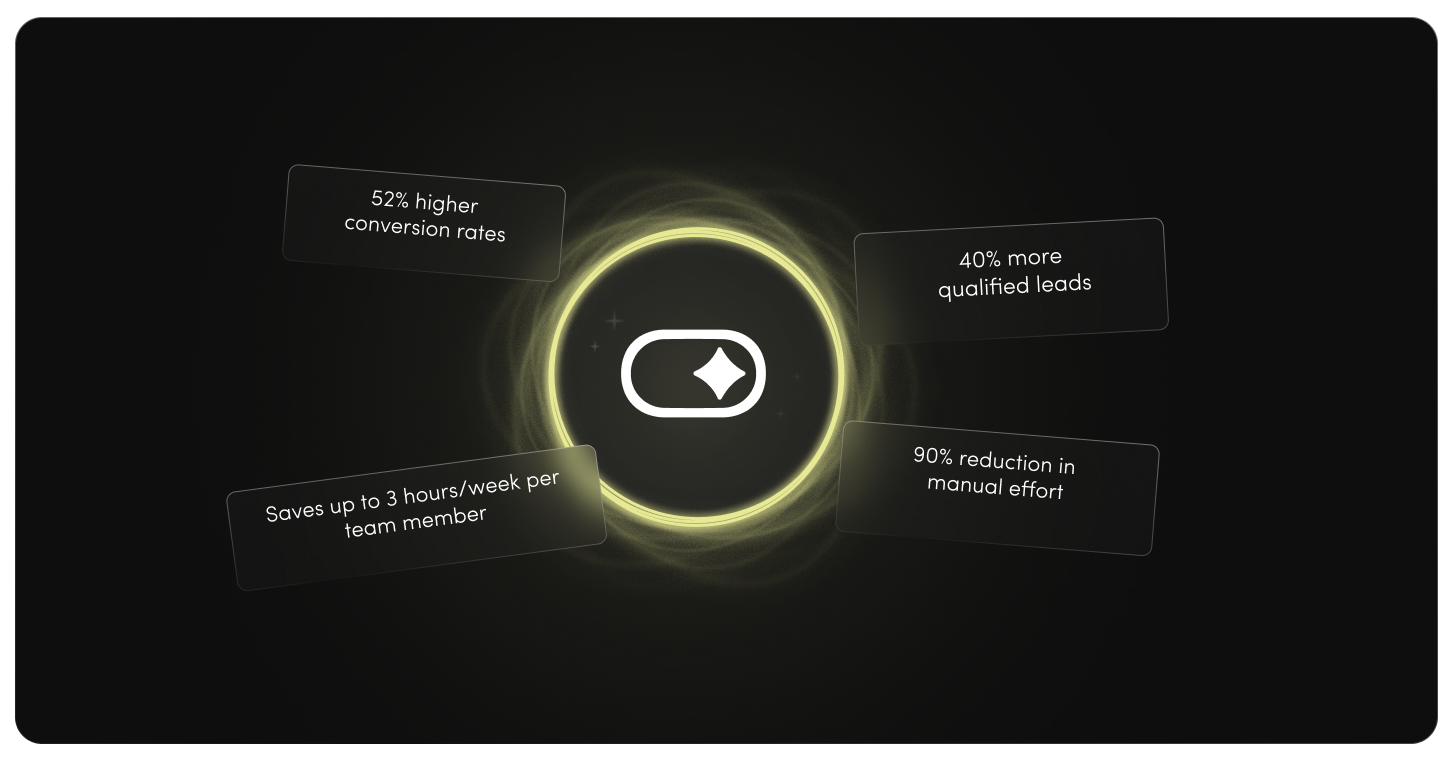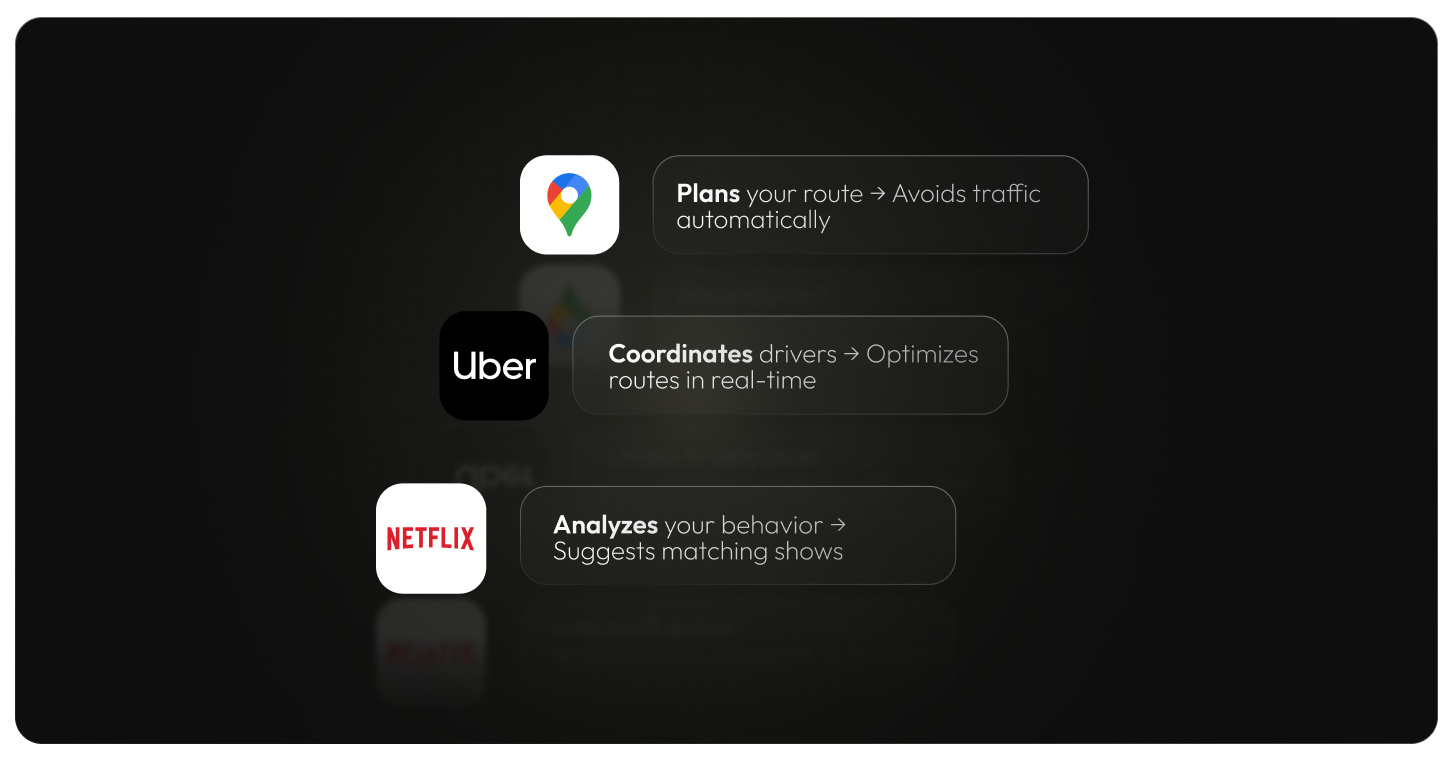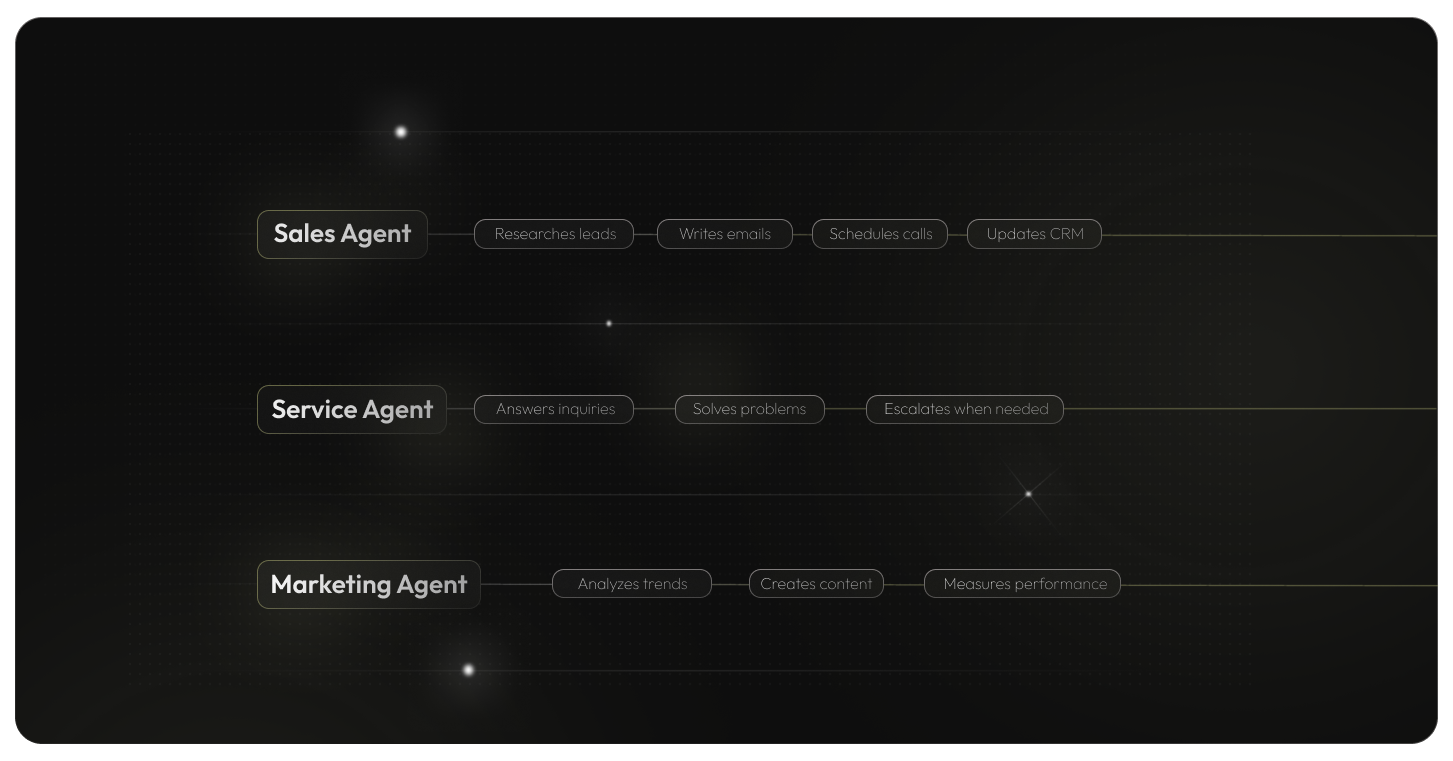
Preview: AI Agents go beyond chatbots. They act autonomously to achieve goals. From cutting wait times to 33 seconds to 24/7 supply chain decisions, discover how these intelligent systems are revolutionizing business.
In the rapidly evolving world of Artificial Intelligence, one term is appearing more and more frequently: AI Agent.
But what exactly lies behind this concept, and why is it being hailed as the next big step in automation? In this article, we'll explain in understandable terms what AI agents are, how they function, and where they're already being successfully deployed today.

An AI agent (also called AI agent or intelligent agent) is an artificial intelligent system that acts autonomously on behalf of a user or another system to achieve defined goals. The crucial difference from conventional software lies in autonomy: An AI agent takes in information from its environment, independently decides on the next steps, and executes actions – all without requiring manual intervention for every step.
Simply put, an AI agent functions in a closed loop: perceive → think → act. This capability for autonomous decision-making fundamentally distinguishes AI agents from traditional software programs or static scripts.
AI agents are often mistakenly equated with chatbots, but the differences are considerable:
Traditional chatbots are primarily limited to dialogue-oriented tasks. They answer questions and conduct conversations, but possess no memory, no tools, and no real capacity for action. A chatbot gives you information or instructions that you then have to implement yourself.
AI agents, on the other hand, can do far more than just conduct conversations. They can look up data in other systems, execute actions, and complete tasks that would normally be handled by a human. In short: chatbots respond, but agents act proactively.
Conventional, rule-based automation follows a static if-then rule set and fails as soon as it encounters situations that lie outside this rule framework. AI agents, however, learn from experience, can handle incomplete information, and dynamically adapt their plan when needed.
The functioning of AI agents can be divided into four main components:
Modern AI agents are frequently based on advanced language models (Large Language Models) that can understand natural language and capture contextual meanings. Unlike pure language models, however, agents can tap into external data sources – through tool calls or API access, they obtain current information from databases, the web, or other systems when needed.
Starting from a clearly defined goal, the agent independently plans the sub-steps necessary to achieve the objective. This process is called Task Decomposition – comparable to how a project manager divides a large project into manageable tasks. Modern agents use various planning paradigms such as the ReAct paradigm (Reasoning and Action), where the agent alternately thinks and acts.
During execution, the agent constantly evaluates the context and makes decisions based on its knowledge state. When information is missing, it draws on tools or additional data sources, updates its knowledge, and adapts its solution path. This iterative process of readjustment enables the agent to deliver meaningful results even with incomplete data or unexpected events.
Advanced AI agents possess working memory and remember previous interactions and results. Through feedback loops, they improve their performance over time and can offer personalized, context-rich interactions.

AI agents are no longer science fiction. In various industries, they're already showing impressive results today:
Agentic systems function as virtual customer advisors that can not only answer customer inquiries but often completely resolve them. A practical example: When retailer Camping World integrated an AI agent into its customer service processes, customer engagement increased by 40%, while wait times dropped from several hours to just 33 seconds.
In complex supply chain networks, AI agents make real-time decisions to optimize goods flow. They continuously monitor the status of all nodes in the supply chain and react autonomously to disruptions. For instance, when a delay occurs, an agent checks alternative suppliers, adjusts delivery dates, and reallocates resources – all within seconds.
Intelligent agents serve as assistance systems for doctors or as personalized health advisors for patients. They can sift through large amounts of medical data to prepare diagnoses, adjust medication recommendations, or continuously monitor patients.
In smart factories, industrial AI agents control flexible production lines, coordinate machines, and monitor quality in real-time. In multi-agent systems, multiple specialized agents work together – for material procurement, production planning, and maintenance forecasting.
Two aspects are particularly crucial for the success of AI agents:
A good agent needs a deep understanding of the context in which it operates. Modern AI agents are therefore often called context-aware – they "know" what's happening around them, why it's relevant, and how it affects their goal achievement.
Besides understanding, an agent also needs sufficient freedom to act. Scope of action means that the agent may make its own decisions within certain boundaries without having to ask for approval for every detail. The art lies in finding a balance between control and autonomy.
A banking group introduced an agentic AI financial assistant for wealth management customers in 2024. This agent analyzes market data around the clock and can autonomously suggest or execute portfolio rebalancing during major price fluctuations. Initial results show that customers with agent support could react faster to market changes and achieved slightly higher portfolio returns on average.
A technology company integrated an AI agent into its IT helpdesk. The agent diagnoses common IT problems and resolves many of them fully automatically within seconds. Since implementation, the average resolution time for standard tickets dropped from 2 hours to 5 minutes, and employee satisfaction with IT support increased significantly.
An automotive supplier established a multi-agent system in a smart factory where various agents control material logistics, production planning, and quality control. All processes run coordinated and without human intervention, enabling faster defect detection, elimination of production interruptions, and reduction of excess inventory.
In the consumer sector, context-aware personal agents are developing that accompany users in daily life. These can not only read emails aloud but also respond immediately, proactively reschedule appointments, and help in environmental situations. According to forecasts, by 2030, many people will use such context-aware AI agents in daily life that give them "digital superpowers".

When you give a conventional system the task of creating a travel plan, it will either fail or only combine predefined modules. An advanced AI agent, however, could independently gather information (flight data, hotels, weather reports), compare alternatives based on user preferences, suggest an optimal travel itinerary, and even make bookings if desired.
In automotive manufacturing, various agents control material logistics, production planning, and quality control. For example, the quality agent recognizes defective components via camera sensors and informs the planning agent, which then adjusts the production plan in real-time. Meanwhile, the logistics agent adjusts supply control to sort out faulty material and provide new material. All this happens coordinated within seconds without human intervention.
Future personal agents will live on smartphones or smart glasses and accompany users in daily life. A futuristic but realistic scenario: The agent listens in meetings, independently creates protocols and to-do lists, and already sets up meetings with colleagues in the background to tackle discussed tasks – without the user actively having to do anything.
It's important that AI agents typically possess only limited rationality: They don't necessarily seek the perfect solution (which would often be computationally impossible), but find a satisfactory solution within given time and resource limits. This concept of bounded rationality ensures that agents deliver practical results instead of getting lost in endless calculations.
A central concept in AI agent functionality is the "perception-action loop": The agent perceives something, processes it cognitively, and reacts to it – continuously in a loop. This enables dynamic adaptation to changing conditions.
Through feedback loops – whether from other agents or human users – agents improve their performance over time. For example, an agent can store received feedback (such as corrections or user satisfaction) after completing a task and consider it in future similar objectives.
Studies estimate that by 2025, around 85% of companies will deploy AI agents to realize efficiency gains and cost savings. Companies that gain early experience with AI agents can secure an innovation advantage and make their organization more agile and scalable.
The practical benefits are already measurable:
Learning: Continuous improvement through experience
Of course, there are also challenges: Implementing AI agents requires investments in technology and qualifications, adaptation of business processes, and attention to risk and ethics topics (security, bias, accountability). However, the rapid advances of recent years show that the technology is maturing for broad deployment.
AI agents represent the next step in automation – toward systems that don't just react, but proactively act. They combine the ability of large AI models to understand knowledge and language with the capability to perform actions in the real world.
AI agents are versatile – from specialized enterprise solutions (support, logistics, manufacturing) to general assistants for everyone. The key is always that the agent is tailored to its environment and has clearly defined goals. Then it can fully utilize its strengths – tireless endurance, speed, data processing, and learning ability.
For C-level decision makers, this creates the opportunity to transform business processes: routine tasks can be automated, decision processes accelerated and optimized based on data, and employees relieved of repetitive activities so they can focus on higher-value tasks.
The rise of AI agents has begun, and it promises to sustainably shape the way we work and live. It's now up to decision makers to strategically use this development while not losing sight of responsibility and trust.
The information presented in this article is based on current scientific publications and practical reports from 2020–2025:
Additional detailed references and links to the mentioned studies can be found in the original research paper.
Source: Cobey.ai / Florian Tisson